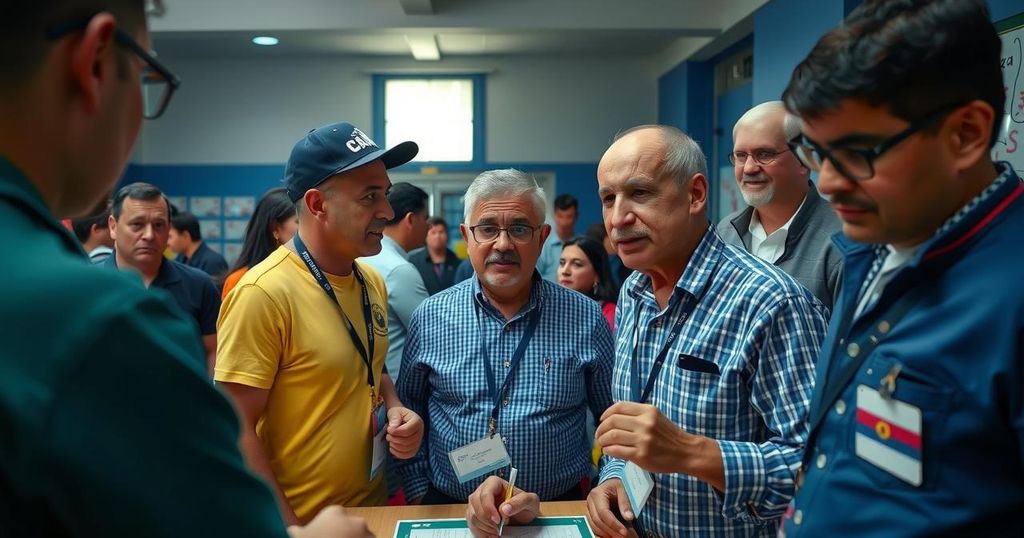Uruguay is conducting a presidential run-off election between leftist candidate Yamandu Orsi and right-leaning Alvaro Delgado. With polls indicating a close race, both candidates aim to attract undecided voters. This election follows five years of a right-wing administration. Economic difficulties and voter sentiment towards inflation may influence outcomes, reflecting broader regional and global electoral trends.
Voting is currently underway in Uruguay’s presidential run-off election, featuring the left-leaning Frente Amplio (Broad Front) party candidate, Yamandu Orsi, competing against Alvaro Delgado of the National Party. This election marks a significant moment for the leftist coalition led by former President José Mujica, who is seeking to reclaim power after five years of right-wing governance. Polling stations opened at 8 a.m. local time and will conclude at 7:30 p.m., with initial results anticipated two hours following the closure of polls.
The election comes at a critical juncture for Uruguay, where approximately 3.4 million residents face a choice between two distinct political visions. Orsi garnered 43.9 percent of the votes in the first round of October’s elections, while Delgado secured 26.8 percent, backed by the conservative Colorado Party. Both candidates are vying for the support of 8 percent of voters from minor parties and those who did not participate in the earlier round.
Amidst a relatively calm political atmosphere in Uruguay, stark contrasts evident in neighboring countries such as Argentina and Brazil are less pronounced here. This is partly attributed to significant overlaps in the political stances of both conservative and liberal coalitions. Additionally, President Luis Lacalle Pou’s high approval rating contrasts with increasing criticism regarding crime under his administration.
Yamandu Orsi has attempted to reassure the electorate regarding his plans, emphasizing a moderate approach rather than advocating drastic policy changes typical of the leftist ideology. Conversely, Delgado seeks to maintain the legacy of the current government while appealing to voters’ desire for continuity. Neither candidate has made significant new commitments in the lead-up to this election, which could influence voter sentiment as they seek to attract undecided constituents and those aligned with smaller parties.
The backdrop of inflation and rising living costs adds further complexity, as it may affect voter behavior and reflects a global trend of incumbent parties losing popularity. Ultimately, this run-off represents not just a choice between two candidates but a critical decision point for Uruguayans as they assess the direction of their nation for the foreseeable future.
Uruguay is experiencing a pivotal moment in its political landscape with the presidential run-off election. The competition highlights a choice between the leftist Frente Amplio, which seeks to reclaim power after five years, and the conservative National Party, which has led the country under President Lacalle Pou. Over the past years, various forces have influenced voter preferences, and the current election reflects broader economic concerns affecting electorates globally. Historical context shows that incumbent parties often face challenges during times of economic distress, making this election particularly significant in gauging voter sentiment and political trends in Latin America.
The run-off election in Uruguay presents crucial implications for the nation’s future direction, where voters are faced with contrasting political ideals. Irrespective of the outcome, the electoral process serves as a vital exercise in democracy as it reflects the electorate’s priorities amidst mounting economic challenges. The decisions made in this election could have lasting impacts on governance, policy direction, and the overall political climate in Uruguay. Observers will be keen to see if the electorate’s response aligns with or diverges from global trends of incumbent parties facing rejection due to broader economic issues.
Original Source: www.aljazeera.com






